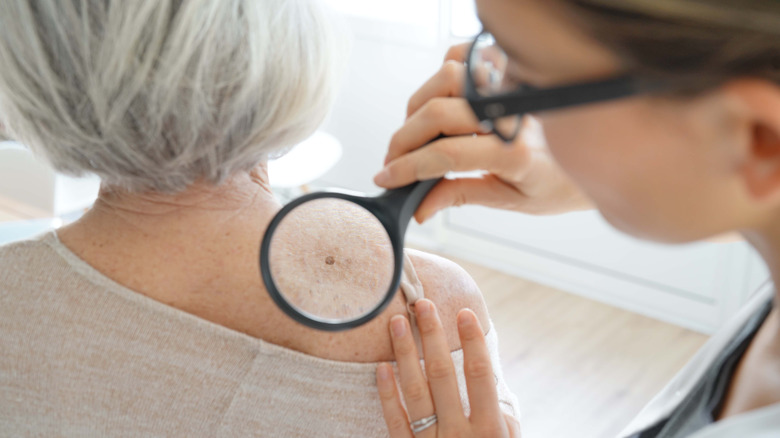Promising Immunotherapy Drug May Soon Become Standard Treatment For Skin Cancer
Next to basal cell carcinoma (BCC), cutaneous squamous cell carcinoma (cSCC) is the second-most common non-melanoma-based form of skin cancer, according to 2022 research published in the scientific journal Biomedicines. Cases of cSCC are on the rise, as they are most often seen in older adults. In addition to aging, those with increased exposure to the sun's ultraviolet rays, individuals with chronic immunosuppression, and those with a history of skin cancer may also be more susceptible to the disease.
While radiotherapy and surgery are often primary methods of treatment (via Biomedicines), a recent clinical trial showed that the use of the immune checkpoint blocker drug, Nivolumab, holds the potential to treat advanced cases of cSCC in aging adults, as reported via Healthline. As an immunotherapy treatment method, Dr. Tanya Nino, a dermatologist and the melanoma program director at the Center for Cancer Prevention and Treatment at Providence St. Joseph Hospital, explained to Healthline how the drug works. "Many cancers have a way of evading our own body's immune system. Immunotherapy boosts your body's immune system to recognize and kill cancer cells," Dr. Nino told the publication.
Measuring positive patient responses
As per the research, 24 patients between the ages of 48 and 93 with cases of cutaneous squamous-cell carcinoma were involved in the safety and efficacy testing of the immunotherapy drug Nivolumab. A dose of 3 mg/kg of the drug was administered to patients every two weeks until either their cancer progressed, they reached unacceptable toxicity, or had received treatment over one year. With an average follow-up period of 17.6 months, the researchers took into consideration factors, such as rates of best response to the treatment, safety, progression-free survival rates, and overall survival rates.
The immunotherapy was found to have a positive effect on 14 participants, reports Healthline. One patient was reported to have reached unacceptable toxicity and suspended treatment. Fatigue, itching, rash, joint pain, and under-active thyroid activity were among the side effects experienced by a reported 21 patients. Overall, the therapy produced significant anti-tumor activity, sustained responses, and was well-tolerated, as per the research.
However, immunotherapy treatments may not be best suited for all patients. "This is the first study to investigate nivolumab in this patient population and it provides further evidence supporting the use of immune checkpoint blockers as standard therapies in cutaneous squamous cell carcinoma," lead study author Dr. Rodrigo R. Munhoz told Healthline.


